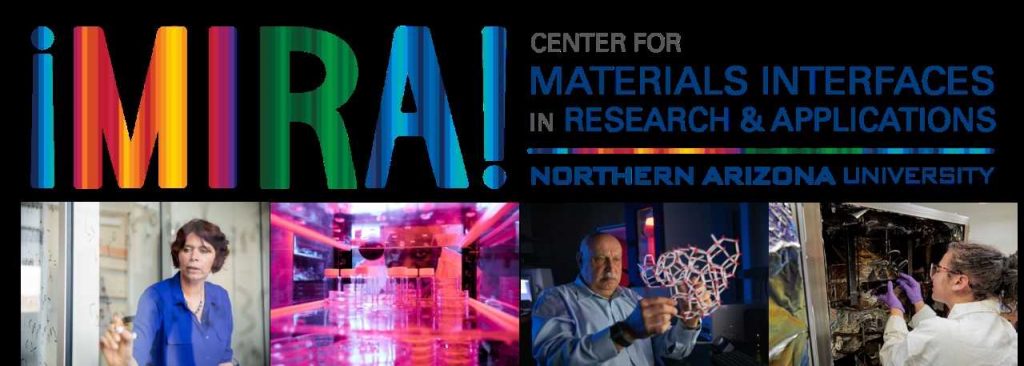Funded through a National Science Foundation grant of more than $4 million, researchers at Northern Arizona University are teaming up with Arizona State University and other regional partners in a five-year effort to expand the reach of the Nanotechnology Collaborative Infrastructure Southwest (NCI-SW) to the communities of northern Arizona and the Four Corners region. NCI-SW is the southwest regional node of the National Nanotechnology Coordinated Infrastructure.
Building on the work begun during the first NCI-SW led by ASU professor Trevor Thornton, this next-generation initiative will add the world-class expertise in theoretical and experimental quantum and soft/biological nanomaterials of the NAU team from the Center for Materials Interfaces in Research and Applications (¡MIRA!) and the Department of Applied Physics and Materials Sciences (APMS), led by co-principal investigators, associate professor Inès Montaño and professor and APMS department chair Gabriel A. Montaño, who are joined by professor Miguel José Yacamán. The NAU researchers also bring years of experience in outreach to diverse communities.
“NNCI helps scientists and engineers in diverse fields solve challenging convergent research problems,” said Dawn Tilbury, NSF assistant director for engineering. “Research and education through NNCI will continue to yield nanotechnology innovations—from interconnects for quantum systems to high-resolution imaging to brain-implanted sensors—that bring economic and societal benefits to us all.”
NCI-SW as a user facility
The primary role of NNCI centers are as user facilities, providing state-of-the-art instrumentation and expertise to researchers from academia, small and large companies and government scientists and students in nanoscale science and engineering. Currently, 16 NNCI centers exist across the country.
The leaders of ¡MIRA!—director and professor Jen Martinez and chief scientist Gabriel Montaño—have extensive experience with the user facility concept. Both were founding staff scientists of the U.S. Department of Energy’s Center for Integrated Nanotechnologies (CINT) user facility prior to coming to NAU.
“Nanotechnology user facilities are incredible hotbeds for scientific discovery,” Gabriel Montaño said. “The impact they can have on students is tremendous. Students, particularly from non-research institutions, are able to work side-by-side with experts as they are introduced to the future of science and technology that is nanoscience. Our students at NAU will grow in leaps and bounds working with users, learning about the wide world of research and growing their networks.”
The NCI-SW will consist of sites at both ASU and NAU, with ¡MIRA! and APMS facilities serving as the core facility base for the NAU NCI-SW site. Users of the NAU NCI-SW site will have access to capabilities and expertise in characterization and modeling of hard and soft materials. Existing foci are in in situ scanning probe microscopies, optical spectroscopies and modelling and simulation of light-matter interactions, as well as quantum training in areas such as quantum information.
Creating opportunity for students and communities in northern Arizona and beyond
The addition of NAU extends the geographical reach of NCI-SW, increasing educational opportunities for communities of northern Arizona and the Four Corners region. NAU will lead new initiatives to create educational opportunities with NCI supporting collaborators, including San Juan Community College in Farmington, New Mexico, and the University of New Mexico-Gallup.
“NCI-SW enables NAU to introduce the students of northern Arizona and the Four Corners to state-of-the-art research and capabilities in nanotechnology,” said NCI-SW NAU PI and site director Inès Montaño. “Instead of just learning about techniques in a book, these students will gain hands-on experience performing research in the ¡MIRA! and APMS NCI site facilities. NAU will serve as a host site for students and teachers to perform summer research and learn about nanotechnology with an emphasis on regional students and teachers from historically underserved community colleges, colleges and high schools of the Southwest.”
NCI-SW NAU also will reach out to residents of Flagstaff and northern Arizona, participating in local events such as the Flagstaff Festival of Science and partnering with ¡MIRA! and the recently established Center for Quantum Networks (CQN), a partnership with lead institution University of Arizona, to create new opportunities for community engagement.
“The combination of opportunities being created by APMS/¡MIRA! teams, including the NCI-SW and recently awarded CQN, are very exciting, particularly for the opportunities being created for students and the communities of northern Arizona,” said NAU President Rita Cheng.
Kerry Bennett | Office of the Vice President for Research




